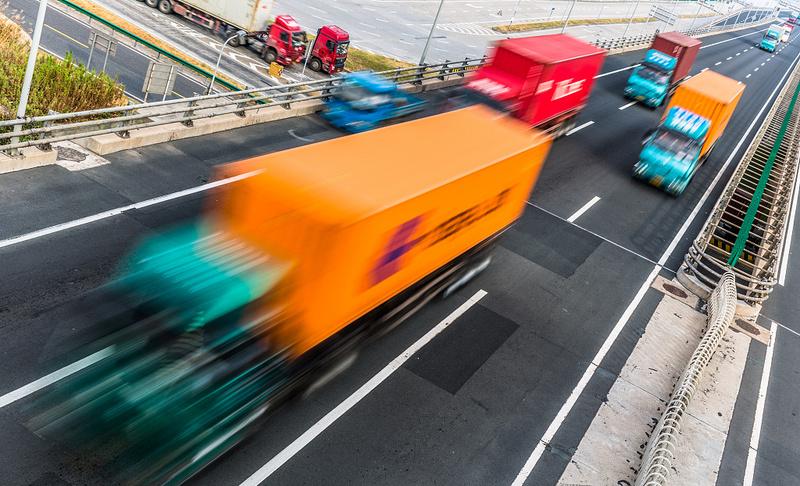According to the Data Bureau of Statistics, in 2014, the total cost of social logistics in China was 10.6 trillion yuan, of which the transportation cost was 5.6 trillion yuan, and there were more than 700,000 logistics intermediaries and information departments, but information asymmetry, non-standardization, low operational efficiency, and high empty driving rate filled the entire market.
O2O companies that try to use the Internet to improve logistics efficiency are roughly divided into two types (in no particular order): intercity freight such as Luoji Logistics, Yunman, Truck Gang, Blessing Truck, Logistics Secretary; same city freight such as Blue Rhinoceros, Speed Paide, Cloud Bird Distribution, Aegis Express, and Cargo Lala. According to the rough statistics of the figures released by enterprises, in the two years from 2014 to 2015, the capital market invested more than one billion yuan in this field.
Four years later, the same city freight has undergone a round of industry reshuffle, and the current 58 express and cargo Lala are in a state of two strong competitions. However, there is naturally no shortage of new players in the market, and "Lightning Dog Technology" is one of the new players in the same city freight.
Choosing to enter the game at this time, what is their entry point? What are their bargaining chips to win the war?
Liu Bin, founder of Lightning Dog, told 36Kr that when the market no longer relies on price wars, but values products and services, it is a state of healthy competition. The lightning dog's opportunity is coming.
The basic business of Lightning Dog Technology is the information matching of vehicle and cargo (no commission), mainly for enterprises to provide customized urban distribution. Derivative business is to provide a series of financial products and services for platform truck drivers, including loan purchase, insurance services, merchant loans, car credits, etc.
In the past 9 months of operation, Lightning Dog has more than 70 large-scale enterprise-level customers, including Xiaomi, SF, JD.com, etc., and the registered drivers on the platform have reached more than 100,000. As of July, the platform had around 65,000 certified drivers and is still growing at a rate of 7,000-8,000 per day. At present, it has settled in 11 first- and second-tier cities, with a single-day GMV of 350,000 yuan in Beijing, and the vehicles and customer demand in the capacity pool are roughly 3:1, with an average daily increase of 500-600 vehicles.

95% of China's more than 30 million truck drivers are self-employed. In addition to freight orders and freight efficiency, most of this group also faces problems such as difficulty in obtaining bank loans and having to pay high premiums due to the high risks of the freight industry, lack of fixed assets and no credit system.
The role of the Lightning Dog platform is the intermediary between banks, insurance companies and drivers, drivers can get third-party loan interest rates lower than 50% of the loan and about 15% lower premium than personal purchases, banks have risk control lending objects and channels to obtain credit data of truck driver groups, insurance companies can get bulk insurance orders.
At present, the main profit of lightning dog comes from the interest spread for drivers and insurance company rebates, and the rest is for pledge financing interest for small B customers.
Liu Bin said that the simple car and cargo matching platform can not form a driver barrier, where there are order drivers to go, and lightning dogs neither take commissions nor charge membership fees, and drivers are more dependent on the platform.
From the perspective of long-term planning, Lightning Dog will also have two main businesses: 1) take land to build warehouses and realize the integration of intelligent warehouses, and 2) villages and villages.
The former lies in Liu Bin's belief that the combination of warehouse allocation is the general trend of the logistics industry, and the integration of warehouse and distribution can improve urban distribution services and achieve one-stop service, but the difficulty lies in how to build warehouses and develop intelligent warehousing systems through government approval.
On the one hand, the latter is that the rural market is difficult but still promising. From the perspective of demand, the rural population is 2-3 times that of townships and cities, and high-quality goods are difficult to reach the countryside, often filled with fake and shoddy products due to poor logistics. From the perspective of purchasing power, the rural population in most areas does not need to bear the pressure of buying a house, and the purchasing power is comparable to that of urban people. On the other hand, the founder's feelings of transforming the status quo of rural logistics.
The Plan of the Lightning Dog is to help the agricultural products out of the upper line and import high-quality goods into the countryside downwards. At present, it has been piloted in Xiong'an New Area and Xi'an, mainly engaged in B2B and B2C freight business. However, many Internet companies are reluctant to set foot in the countryside precisely because of the difficulties in front of them - the rural market is scattered, the upfront investment is large, the return cycle is long, and the development situation is seriously limited by the regional economy.
If you look a little closer, the next goal is to make a nationwide layout, with 18-20 cities expected to be deployed by the end of this year.
Lightning Dog has received 100 million yuan in financing in April this year, and the investors are Dongxu Group and Dongding International. It is expected to launch the B round in October this year, with a target financing of 6-1 billion yuan, which will be mainly used for system research and development and expansion.